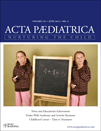Subclinical hypothyroidism in in vitro fertilization babies
Abstract
Aim: Assisted reproduction technology is used widely all over the world. There is a great concern about the morbidity of in vitro fertilization (IVF) babies, but investigations are mostly related to mechanical conditions that are attributed to multiparity. This paper aimed to investigate the effect of IVF on thyroid functions in newborns.
Methods: A total of 98 healthy, term IVF newborns were evaluated between postnatal 2–4 weeks of age by screening of thyroid functions between July 2006 and April 2008. Ten subjects were assessed as a study group whose thyroid-stimulating hormone (TSH) levels were higher than 6.5 mU/L. Control group consisted of randomly selected 10 naturally conceived infants with hyperthyrotropinemia (whose TSH levels were higher than 6.5 mU/L but under 15 mU/L) with the same age. All children were thoroughly examined, and serum fT4, TSH, anti-thyroid peroxidase and anti-thyroglobulin antibodies were measured, and a thyrotropin-releasing hormone (TRH) test was performed in all subjects in both groups.
Results: Euthyroid hyperthyrotropinemia was diagnosed in approximately 10% of IVF babies. Exaggerated TSH levels to TRH were obtained in all IVF babies (subclinical hypothyroidism) but in none of the controls. A significant difference was noted in the concentration of TSH at the 20th min between the two groups (p < 0.001). Besides, sustained and delayed TSH responses were observed in IVF babies. Neonatal screening tests were negative in both of the groups.
Conclusion: In IVF babies, despite normal neonatal screening tests, subclinical hypothyroidism might be observed that suggests the need for screening in this respect.




